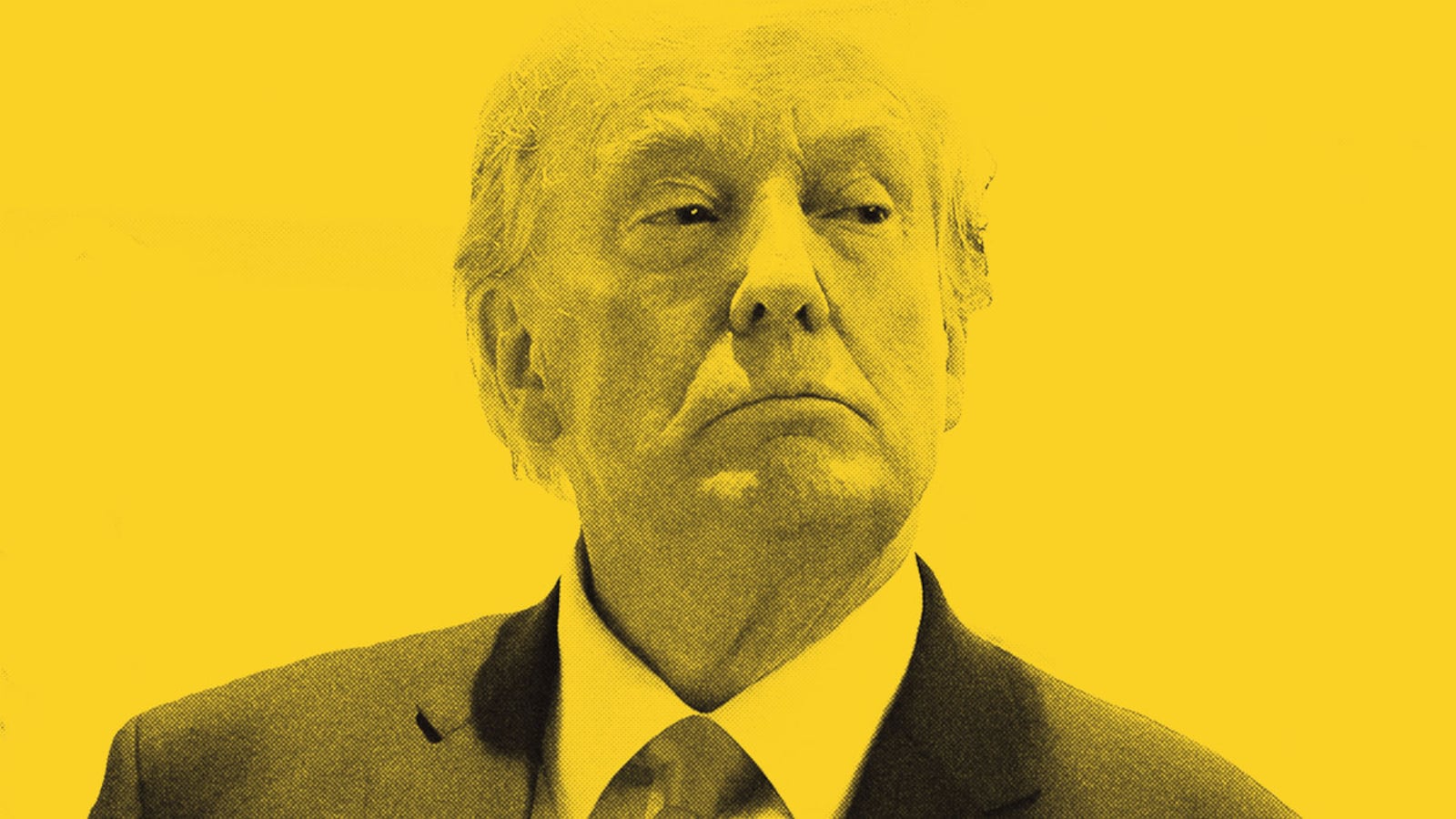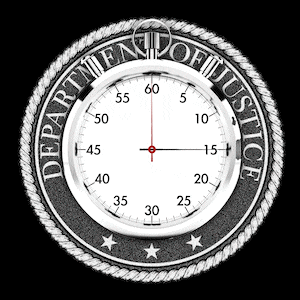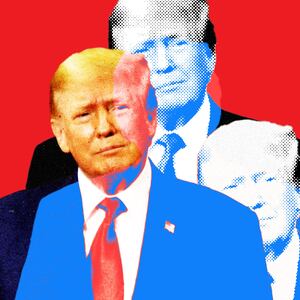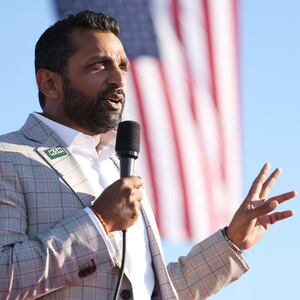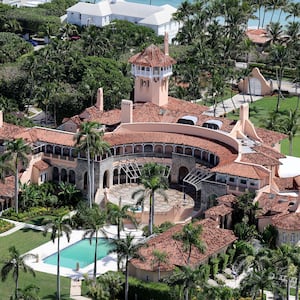Former President Donald Trump’s bizarre and insanely early rollout of his 2024 presidential campaign has former prosecutors accusing him of simply seeking cover from a potential federal criminal indictment. But those same legal experts say Trump announcing his candidacy would at best only delay a prosecution—and at worst cause a MAGA insurrection.
“Trump put down a marker. He thinks that’ll give him some political cover,” James D. Zirin, a former federal prosecutor, said of Trump’s decision to announce. “It’ll put him in a stronger position to fire up his base and claim the whole thing is a political witch hunt and send them out into the streets.”
While another violent insurrection would be a worst-case scenario, Trump announcing for president will make the Justice Department more skittish about indicting him—but only because the Department of Justice is so concerned about appearances.
The DOJ’s internal guidelines frown upon prosecutions that affect campaigns within 60 days of Election Day. There isn’t a formal rule, however. Attorney General Merrick Garland has just shown that he tries to avoid any appearance of political interference—and is often consumed with restoring the DOJ’s reputation.
It’s possible that consideration already prevented the Justice Department from indicting the former president for plotting to stay in power after losing the 2020 election, or for mishandling classified documents after leaving the White House. But with the looming prospect that those shackles would be unfettered the very next day after the election, Trump on Monday declared that he would make a “big announcement” on Nov. 15, presumably buying him another week of protection in this theory.
What Trump may not have realized is that his November announcement won’t give him any more protection than he already has; Georgia’s Senate race heading for a runoff election on Dec. 6 puts the Justice Department’s so-called “60-day rule” back in effect, three former prosecutors said.
“He’s doing it because he thought he was shielded by the 60-day rule, and by now it would be expired,” Ziring said. “He made the announcement before he knew there’d be a runoff in Georgia.”
While Trump may want to ensure there’s no gap between the election and the time he’s a candidate, the reality is this “rule” has never actually been a rule. More to the point, Garland is on even firmer footing for a prosecution because he could argue Trump is trying to game the system.
And regardless of Trump’s candidacy, former federal prosecutors told The Daily Beast they’re confident the former president will be indicted. “It is his intention by announcing that to retard criminal cases,” said Thomas Baer, a retired federal prosecutor in New York City. “He thinks that if he is running for president this will cause prosecutors to drop their cases or think twice because it could be interpreted as political, a reaction to his running. The answer is: No, they will not hold back.”
The real effect of Trump continuing to delay the official announcement of his third run for the White House, legal experts said, is that it comes with the threat of political violence.
“It will do harm to the country to have a prosecution of a former president, even though the former president is a real bad person who wouldn’t hesitate to destroy our democracy if he thought it would be in his advantage to do so,” said Martin London, a retired New York attorney who once led the massive law firm of Paul Weiss.
“If you’re asking whether the government should indict him in the face of [the] adversity it will produce in terms of all the lunatics who will come out and make threats, my answer is, yes. Not only they should but they must. They must indict him if they find that he has violated the criminal law,” London added. “I’d like to see Garland hurry up, get this done, and indict this son of a bitch.”
Several retired prosecutors who worked at the Department of Justice told The Daily Beast that Trump’s delay game is obviously a direct counter to the DOJ’s multiple ongoing investigations.
The DOJ is being deliberate and careful. Garland, whose stellar prosecution record and stoic demeanor nearly landed him on the Supreme Court during the Obama administration, is being extremely cautious to avoid having these historic investigations of a former president appear to be a partisan hack job.
He issued a department memo in May titled “election year sensitivities” stressing the importance of abiding by the DOJ axiom of not interfering with elections. After what The Wall Street Journal described as “weeks” of deliberations, Garland approved the Mar-a-Lago search early enough to ensure that it occurred 92 days before the midterm elections—far outside the traditional 60-day quiet period.
Then he managed to keep the Trump investigations quiet nearly all summer. When Trump himself brought national attention to the FBI’s search of his oceanside Florida mansion of Mar-a-Lago in August, Garland had the DOJ make aspects of the investigation public—while still keeping the most damning details under seal.
And now, according to CNN, Garland is even considering the use of a special counsel to independently manage a prosecution of Trump, adding a layer of bureaucracy some legal scholars see as unnecessary.
But the New York businessman, who has turned American politics upside down since 2015, is doing the same thing he always does: using institutions’ strict adherence to tradition against them.
Fully aware that prosecuting a former president looks bad but targeting a presidential candidate is even worse, Trump has been hinting at another presidential run since at least February 2021, only a month after leaving the White House.
“Who knows? I might even decide to beat them for a third time,” Trump said at CPAC, the Conservative Political Action Conference, in a speech where he lied about winning his second run and railed against Democrats.
Since then, his stream-of-consciousness speeches at rallies and political conferences in Arizona, the District of Columbia and elsewhere have been peppered with references of a 2024 run.
There are, of course, other advantages to holding back a formal announcement. Campaign finance laws prohibit Trump from directly coordinating with his sprawling network of political action committees, like Save America and Make America Great Again Inc. But by maintaining himself as a mere private citizen, Trump can use these PACs to finance his travel and rallies while not abiding by strict reporting requirements—something that Rolling Stone last year decried as a “shadow campaign designed to skirt campaign finance regulations.”
But at this point, the DOJ is far enough along with its investigations to potentially indict Trump. A California federal judge has already revealed that Trump signed off on voter fraud allegations in a lawsuit that he knew at the time were false, potentially bolstering any prosecution for Trump’s unprecedented attempt to cling to power. And a federal appellate court has given federal prosecutors the freedom to review all of the classified documents recovered at Mar-a-Lago, a case that could simply boil down to whether or not Trump was in possession of them—which he was.
The length of these long-running investigations should be enough to prove that the DOJ didn’t just wait for Trump to announce a run. Baer said Trump’s bet this time around will be a total failure.
“His calculation is bad judgment, because the fact that he decides to run for president does not change the fact that all of these crimes—that he committed—were being investigated before he made the announcement,” Baer said.
There’s now a growing worry that waiting any longer could spill over into the 2024 election cycle—and maybe even the next presidential inauguration.
“The longer Garland takes to indict Trump—and I think it must happen and will happen—the closer we come to Jan. 20, 2025. And if there is a pending indictment or even a trial in 2025 and there is a possible Republican president, that could be the end of the prosecution. I think Ron DeSantis or Mike Pence would pardon him,” London said.
“He’s like Hamlet. He’s a man of action delayed by thought. This is the kind of guy you’d play chess with as a kid who wouldn’t let go of the piece,” Zirin said. “If he wants to vindicate the public, he should strike now.”
Some think that even Republicans should get on board, particularly given the way that Republicans failed to realize a comeback and Trump-backed election denying candidates across the country were resoundingly rejected by voters this week. Even Trump’s former White House communications director, Alyssa Farah Griffin, called him a “loser.”
“I do think Trump believes he can avoid prosecution by running for president and causing delays. That’s another Trump strategy: Delay and run out the clock. But many Republicans simply have a selfish and practical interest in seeing Trump prosecuted and convicted—for anything, really. They want him out of their way either for their ambition or because he is clearly dragging the party down with bad candidates,” said Eric Owens, a retired lawyer who previously wrote for the conservative website The Daily Caller.

